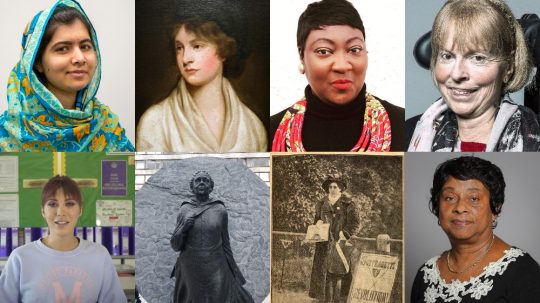
Voice over: 1918, women get the right to vote. 1961, the contraceptive pill becomes available on the NHS. 1967, the Abortion Act is introduced. 1975, the Equal Pay and Sex Discrimination Acts come into force. 2017, #MeToo.
Jo Stevens: Women's rights to me means women sticking together.
Vivienne Rose: We're fighting for humanity, not just for women.
Cerys Furlong: In many ways in Wales, as a small nation, we can push those boundaries a bit further and be more ambitious.
Jo Stevens: In 100 years, I'm only the 426th woman to be elected as a Member of Parliament. So women are still discriminated against, most of the government's tax and benefit cuts disproportionately hit women. We don't yet have equal pay for women and men.
Cerys Furlong: The Equal Pay Act has been around since the 1970s. That gave women the tools to be able to make the case to employers to collectively work as trade unions, organise together as women to be able to make sure that they were paid fairly for the work that they did.
Tina Reecel: It's the violence against women, it's just such a pervasive part of women's lives and we've seen with the #MeToo and everything, the kind of continuum of violence it starts from the low level, I guess, harassment through to the really serious domestic abuse.
Vivienne Rose: The 1967 Abortion Act brought abortion out of the shadows. It didn't decriminalise it, it just made it lawful for women to access termination, under very specific conditions.
Cerys Furlong: A huge amount of our work is about women's rights, particularly the hard-won rights that we see in terms of employment law, in terms of equality legislation.
Tina Reecel: Our work is focused on human rights, we use it especially to hold people like the police to account. What they do has an impact on people's right to life.
Vivienne Rose: Human rights law ensures that women get to make the decisions that are right for themselves and that are right for their families without being criminalised for them.
Cerys Furlong: I think human rights laws are incredibly important to women, they represent a kind of universal minimum standard that we should expect.
Tina Reecel: Women's rights, their human rights in that context, is just about having the freedom, freedom of choice. We try and do that by raising issues with politicians. You know, the slightly uncomfortable subjects that maybe people don't want to think about or don't want to talk about. We keep banging on about them and keep saying, you know, look at us over here.
Cerys Furlong: There have been a number of campaigns and marches this year and Cardiff particularly as the capital we have the opportunity to engage in a number of those and there's a really strong women's movement in Wales.
Jo Stevens: We've all got a role to play in promoting and defending women's rights. So it's the way we bring up our children. It's the way we talk to each other. It's how we behave in the workplace and outside.
Cerys Furlong: Human rights are really women's rights as far as I can see.







